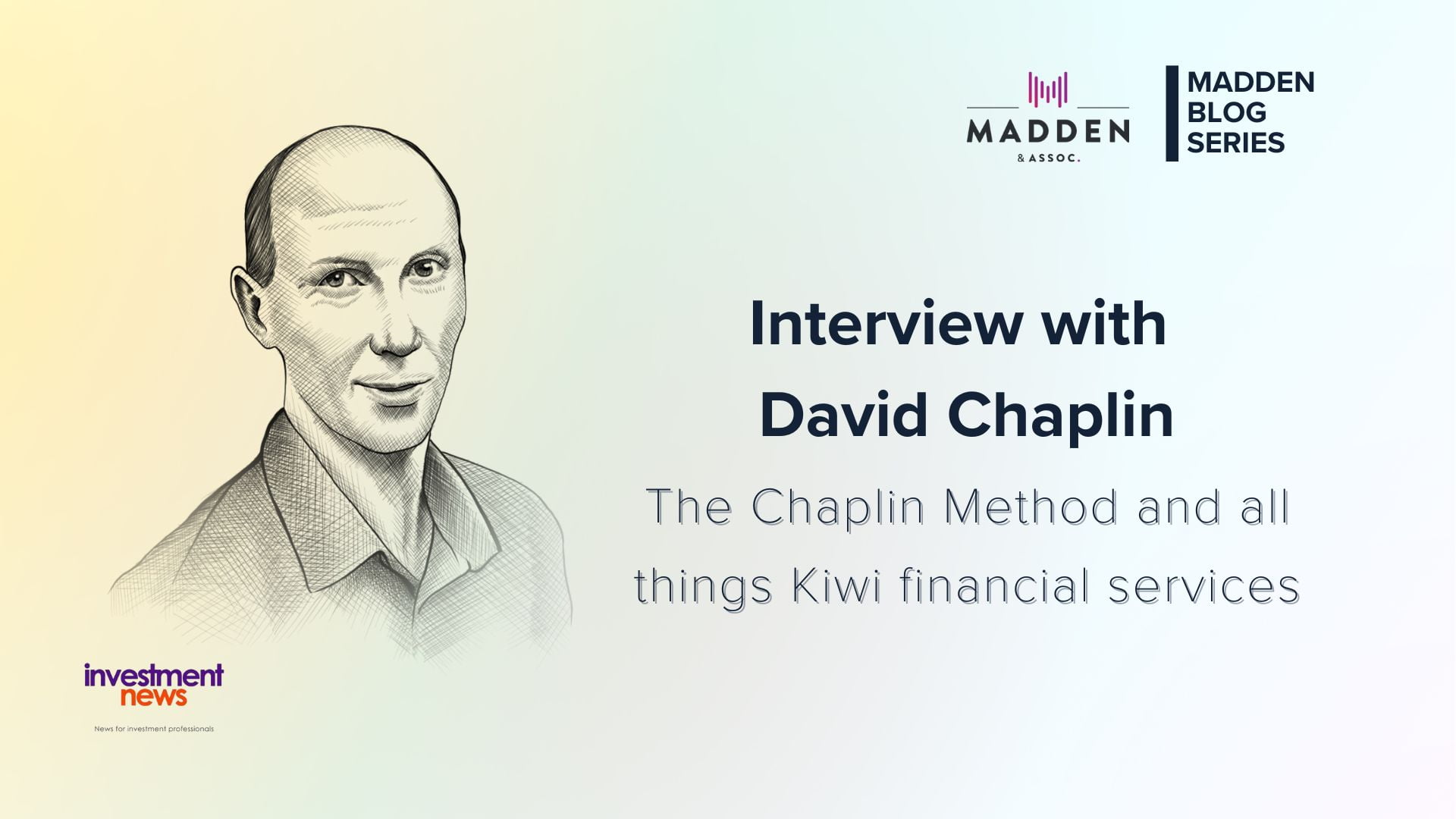Among the more knowledgeable and elegant of senior scribe friends in the Madden group of finance reporter colleagues is New Zealand-based financial services writer David Chaplin. Founder of online industry news service Investment News, David began his career in finance reporting in Sydney, turning his fruitful business and finance reporting stint in Australia as the inspiration for his Kiwi platform and growing industry audience.
He caught up with Bruce Madden recently to discuss all things journalism and finance.
Dave, when did Investment News begin?
I launched Investment News in February 2015. The thesis was (and is) that the emergence of KiwiSaver and new regulation of fund managers and advisers would spur the growth of the local investment industry as well as interest in NZ from offshore firms – similar to what I saw happened in Australia with super and advice sectors.
At the same time there are a couple of large government funds (ACC and NZ Super) and numerous other wholesale asset owners that also generate stories.
Who are your readers?
Financial advisers are the largest component, but the audience also includes fund managers, consultants, trustees, lawyers and others associated with the financial services industry.
What differentiates the New Zealand asset management market from its Australian cousin? Is regulation a bigger or lesser factor in NZ? It certainly pervades all aspects of the Australian industry.
Obviously, NZ is smaller – there’s about NZ$160bn of retail money in managed funds (including KiwiSaver, which should have gone over NZ$100bn in the June quarter). There’s probably another NZ$50bn or so in what Australia would call managed accounts. And then over NZ$100bn in NZ Super and ACC funds combined plus maybe another NZ$50bn-100bn in other wholesale funds.
Regulation is important here, too, if not as complex as Australia (especially comparing super v KiwiSaver). There are 66 licensed fund managers here (plus an unknown number of wholesale managers who don’t have to be licensed and face much looser disclosure rules) under a law that came into place in 2013. Like in Australia, the regulator here – the Financial Markets Authority – has been applying more pressure on the sector recently over greenwashing, fees and ‘value-for-money’, and advertising.
A couple of new laws including a world-first climate-reporting regime and the so-called conduct of financial institutions (COFI) legislation are also imposing new obligations on fund managers and others (banks and insurers mainly for COFI).
The NZ financial advisory sector is also operating under a new law that came into full force this March that moves it more into the direction of the entity-licensing system used in Australia – previously, investment advisers were licensed as individuals while others such as insurance and mortgage advisers were ‘registered’ individually.
Another important difference for funds and KiwiSaver v Australia is tax: in NZ most funds are now structured as portfolio investment entities (PIEs) where tax is levied on individual investors, rather than in-fund, at one of four rates – the top PIE rate represents a discount compared to higher marginal tax rates. NZ also doesn’t have a formal capital gains tax or complicated contribution and withdrawal rules for KiwiSaver v Australian super.
How successful is the KiwiSaver system?
KiwiSaver has been remarkably successful in growing members given it’s not compulsory – they can join voluntarily, or employees are signed up automatically when they start a job if they are not already members (but they can opt out of this). The early growth post launch in 2007 was a big surprise to government at the time. Today there are about 3.2m members out of a total population of more than 5m.
As I said earlier, the total KiwiSaver FUM (Funds Under Management) has just hit $100bn (I think) – so it’s tiny when measured against Australia. Also, a significant number of KiwiSaver members don’t contribute regularly – there’s easy ways to take a break that don’t exist in Australian super – and the mandatory contribution rates are low – 3% each from employer and employee.
KiwiSaver was started from a commercial perspective – no industry funds here – so Australian banks and AMP were the early winners and they still own about two-thirds of the market despite losing share over the last decade. There are about 38 schemes and 30 providers now including some pretty big locally owned ones – about half of them manage under NZ$1bn.
Does the post-retirement phase figure in industry circles as much as we see here with retiring boomers set to access their savings in larger numbers?
NZ has similar demographics to Australia, but the post-retirement debate is different. There is only one dedicated scheme marketing a kind of allocated pension, for example – it used to have a guaranteed income component but had to shut that down due to low interest rates. KiwiSaver providers don’t have to offer pension or annuity-like options to retirees, but members can keep money in the schemes past the official retirement age of 65 (although, the marginal government incentives and mandatory employer contributions cease for them).
Also, unlike Australia, the NZ government pension is universal (not means-tested), which sets a floor on retirement income. Proportionately, more New Zealanders remain employed past age 65 than in Australia, too, I recall.
What is the most Kiwi of stories you have reported on?
Probably the most recent ultra-Kiwi story I reported on was the sale of Kiwi Wealth (then owned by the government), which was ultimately sold to another iconic Kiwi brand, Fisher Funds (which is actually a third-owned by US private equity firm, TA Associates). I broke the story, so I like it of course, but it also hit all those nationalistic notes about NZ keeping ownership of assets (Kiwi Wealth was mainly a KiwiSaver scheme), government selling precious crown jewels etc, especially when an Australian buyer was in the mix.
Also, and I don’t know why, this story I wrote in 2020 based on a webinar with Michael Cullen – the politician who was responsible for both NZ Super and KiwiSaver – popped into mind. He was doing a zoom or something from his home, rambling on about CGT (Capital Gains Tax) (he was chairing a committee looking into it) and his dog walked in half-way through – maybe he epitomised a relaxed Kiwi style. Cullen was always fun to talk to in a way I can’t remember any Australian politicians (ex or otherwise) being.

